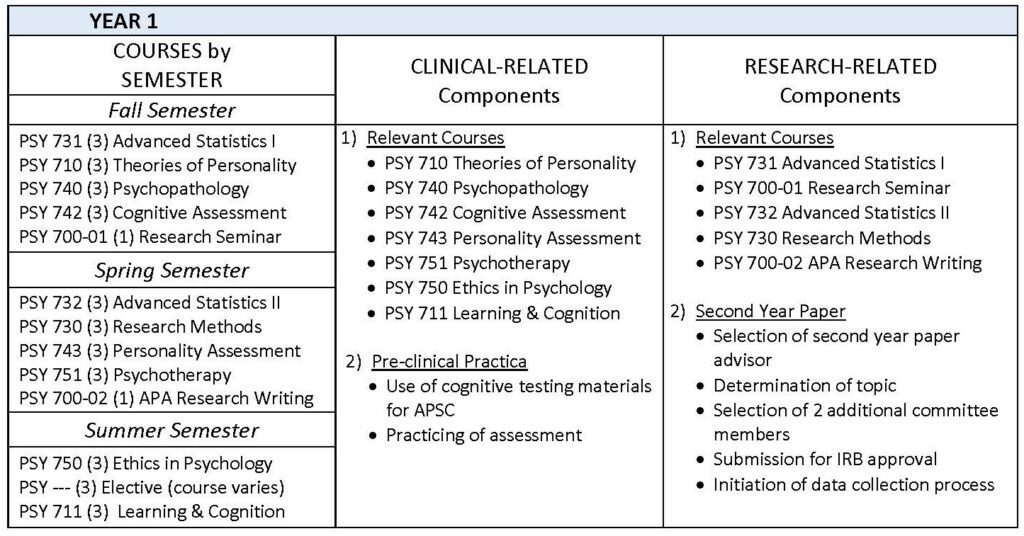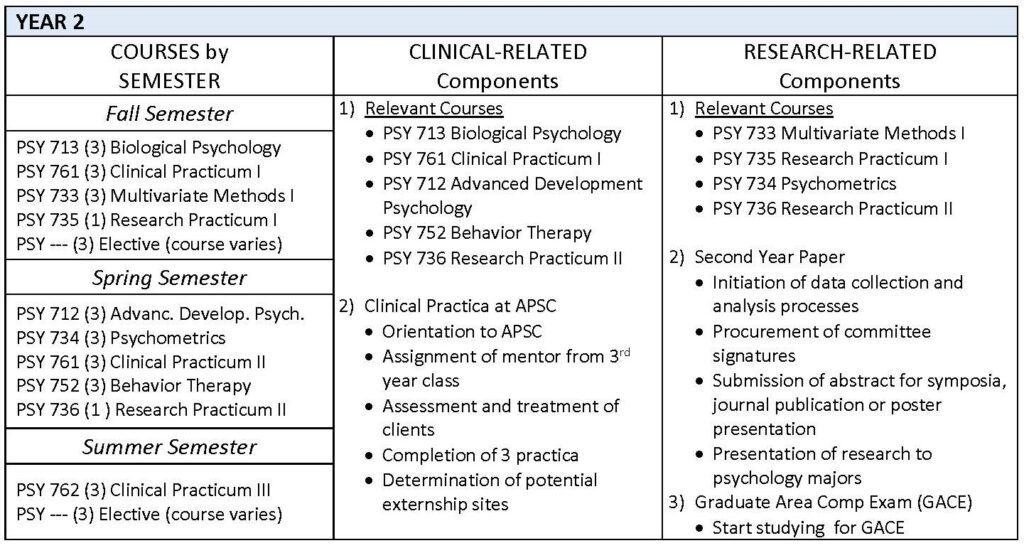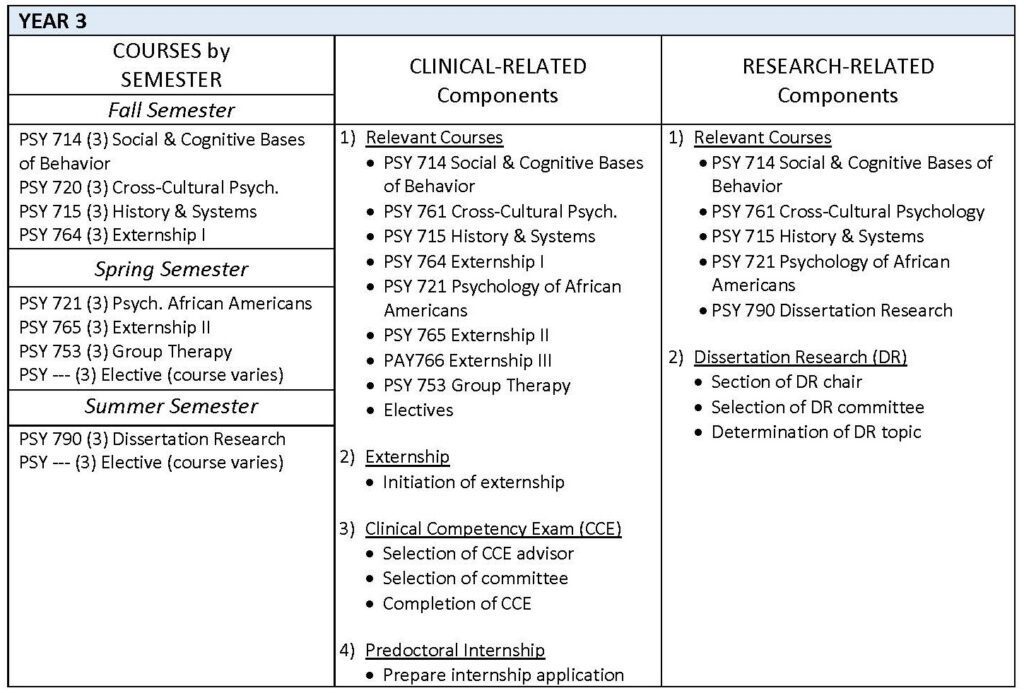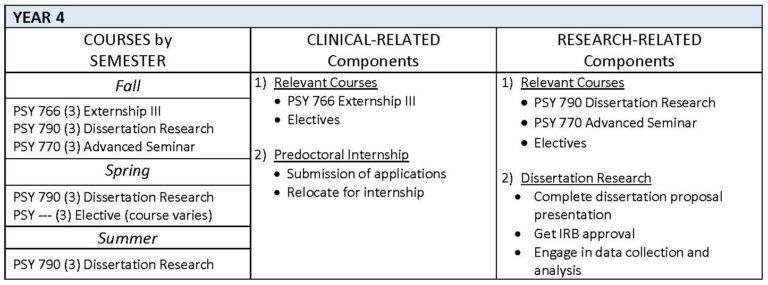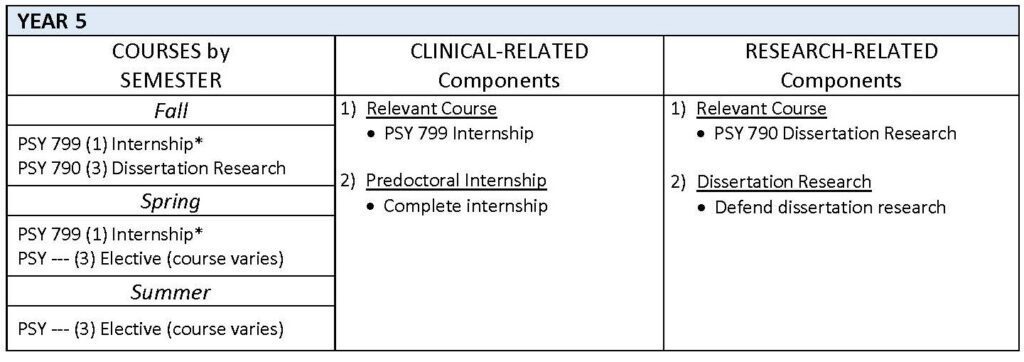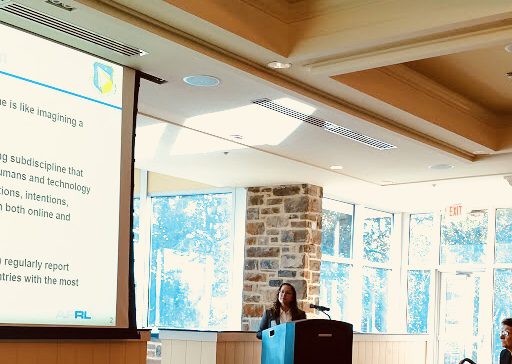Department of Psychology
College of Liberal Arts
The Department of Psychology at Jackson State University is a unit of the School of Social and Behavioral Sciences in the College of Liberal Arts
Degree Requirements, Curriculum, and Course Description
CURRICULUM
In order to fulfill the training model upon which the program is based and the multicultural focus in which it is grounded, students must first show respect for cultural and individual differences as well as demonstrating a multicultural approach to their work. Again, courses and applied experience are both used to teach and reinforce these ideas, especially as they pertain to gender, ethnicity, age, disability, religion, and sexual preference. This multicultural awareness should come across both in the appropriate fieldwork and in the research in which students engage. They must demonstrate the ability to write literature reviews, with references to resources in cross-cultural and multicultural psychology where appropriate. Building upon existing literature, students are required to know how to perform their own original research, including its methodology, data collection, and analysis. To complete this analysis, students must show they can apply major statistical tests and procedures as part of research activities. Course work covers the content of statistical testing and how to interpret meaningfully the results. Such functionality must be demonstrated for any research question or questions the student undertakes, including that of his/her dissertation project.
The Clinical Psychology Doctoral Program is a full-time, on-campus program requiring a minimum of five years of post-baccalaureate study, including the completion of dissertation research and a one-year, full-time pre-doctoral internship. A minimum residency requirement of three years must be met. A student is expected to complete all requirements for the degree and graduate within eight years of the date of first registration. Students must satisfactorily complete all of the required courses listed below. In addition, they must successfully complete the Graduate Area Comprehensive Examination (GACE), Clinical Competency Examination, and Dissertation Research. Each of these components is discussed in the following sections of this handbook.
REQUIRED COURSES
The curriculum is presented in a model course sequence. While the courses generally are offered in the sequence shown below, exceptions can occur. Some courses may be offered during the summer sessions, for instance. Students, in conjunction with their advisors and the DCT, may plan an individualized course sequence that will best meet their educational goals and timetable. In doing so, however, care should be exercised to ensure that all prerequisites and co-requisites are met. It should be emphasized that students should seek guidance and approval from appropriate faculty members before making such adjustments.
The program requires 18 hours of General Core Courses, 16 hours of Research Core Courses, 21 hours of Clinical Core Courses, 9 hours of Multicultural/Diversity Core Courses, 20 hours of Practica and Externship Courses, 9 hours of Elective Courses, 9 hours of Dissertation Credit, and a one year internship in an APPIC- approved setting (during which the student registers for at least 2 hours of Internship credit). The required courses, arranged in a model sequence, are presented below.
PROGRAM MODEL OF COURSES
COURSE DESCRIPTIONS
General Core (18 hrs)
PSY 710 Theories of Personality (3 hrs): Consideration of the major theoretical orientations concerning personality and the evidential basis for each.
PSY 711 Learning and Cognition (3 hrs): Research and theory in human and animal learning, memory, and cognition.
PSY 712 Advanced Developmental Psychology (3 hrs): A study of the biological, social, and cultural factors affecting human development. Cross‑cultural perspectives will be emphasized.
PSY 713 Biological Psychology (3 hrs): Physiological bases of learning and motivation; nervous system structure, function, and disorder in relation to behavior.
PSY 714 Social and Cognitive Bases of Behavior (3 hrs): Theory and research on attitude formation and change, attributional styles, prejudice, interpersonal perception, group dynamics, self‑regulation, and cognitive styles.
PSY 715 History and Systems (3 hrs): Historical evolution of psychology from philosophical antecedents to the development of major systems and theories.
Research Core (17 hrs)
PSY 731 Advanced Statistics I (3 hrs): Elements of probability theory, discrete and continuous random variables and their distributions, principles of estimation, hypothesis testing, introduction to regression and analysis of variance, computer applications.
PSY 732 Advanced Statistics II (3 hrs): Advance topics in regression and analysis of variance, analysis of covariance, non‑parametric procedures, and computer applications.
PSY 730 Research Methods (3 hrs): An in-depth study of research methodology with emphasis on scientific thinking. The course covers basic within- and between- group experimental designs, mixed designs, single subject experiments, non‑experimental research (correlational methods, case studies, meta-analysis) and program evaluation. Research ethics are stressed. Further, students are required to begin developing a topic for their second year paper.
PSY 734 Psychometrics (3 hrs): Theories of measurement; evaluation of psychological assessment processes; test construction, validation, uses, problems, and social implications.
PSY 700-01 Research Seminar (1 hr): Review and discussion of ongoing departmental research project; literature review of research topics of interest. The seminar is intended to assist the student in developing research ideas for implementation.
PSY 700-02 APA Research Writing (1 hr): designed to enhance students’ ability to write technical documents (e.g., 2nd Year Paper, dissertation, manuscripts) and prepare manuscripts for submission to nationally recognized, peer-reviewed journals.
PSY 733 Multivariate Methods I (3 hrs): Multivariate analysis of variance and covariance, canonical correlation, factor analysis, discriminant analysis, selected advanced topics.
Clinical Core (21 hrs)
PSY 750 Ethics in Psychology (3 hrs): Professional and ethical issues affecting the practice of psychology. Focus will be on the development of sound ethical and professional standards in psychology practice, teaching, and research.
PSY 740 Psychopathology (3 hrs): Etiology, epidemiology, and dynamics of behavior and personality disorders, theory, research, diagnosis and treatment. Introduction to DSM IV-TR as a diagnostic tool.
PSY 751 Psychotherapy (3 hrs): Critical examination of principles, techniques, research, and theoretical models in psychotherapy.
PSY 742 Cognitive Assessment (3 hrs): Administration and interpretation of major intelligence tests and other cognitive instruments. Interpretation and report writing are emphasized.
PSY 743 Personality Assessment (3 hrs): Theoretical, conceptual and methodological aspects of objectives and projective personality assessment, integration of results into the written psychological test report.
PSY 752 Behavior Therapy (3 hrs): Principles of behavior modification and their application in psychotherapy.
PSY 753 Group Therapy (3 hrs): Therapeutic procedures for small clinical groups, dynamics of clinical groups.
Multicultural/Diversity Core (9 hrs)
PSY 720 Cross‑Cultural Psychology (3 hrs): An examination of research and practice regarding assessment and treatment of culturally diverse populations with particular emphasis on the cultural context of symptoms and causes of psychological disorders.
PSY 722 Psychology in the Urban Environment (3 hrs): The city as an environment, personal space and territoriality, crowding, noise, crime, drugs, and other urban hazards. Special problems of minorities in urban setting.
PSY 723 Psychology of Gender (3 hrs): Research and theory regarding gender differences and similarities.
PSY 721 Psychology of African-Americans (3 hrs): A study of the psychological literature pertaining to the cultural, social, and political realities of African-Americans; a critical analysis of the development of Black Psychology and its contributions to clinical psychology.
PSY 776 LGBT+ Psychology (3 hrs): A study of LGBTQ+ people from an intersectional, affirmative perspective that includes consideration of the developmental, cultural, and interpersonal contexts that impact LGBTQ+ people’s identities, lives, and mental health. Empirically based clinical practice information including affirmative psychotherapy and supervision will be explored.
Practica and Externships (20 hrs)
PSY 760 Clinical Practicum I (3 hrs): Supervised training experience in interviewing and cognitive assessment.
PSY 761 Clinical Practicum II (3 hrs): Supervised training and experience in personality assessment and psychotherapeutic procedures.
PSY 762 Clinical Practicum III (3 hrs): Supervised training and experience in psychodiagnostics and psychotherapy. This course requires a minimum of ten clock hours per week. The student is expected to become competent in interviewing, assessment, therapy, and case conceptualization.
PSY 735 Research Practicum I (variable credits 1 – 6 hrs): Supervised experience conducting a psychological research project. The student will review literature, conceptualize a research problem, formulate a research hypothesis and design a study to test it, execute the study, analyze the data, and write the second year paper.
PSY 761 Research Practicum II
PSY 764 Externship I (3 hrs): Fifteen hours per week of supervised clinical experience in approved community, institutional, or hospital settings.
PSY 765 Externship II (3 hrs)
PSY 766 Externship III (3 hrs)
PSY 767 Externship IV (1-3 hrs) optional advanced externship
PSY 768 Externship V (1-3 hrs) optional advanced externship
Electives (minimum of 9 hrs)
The student must take at least 3 of the following 12 courses:
PSY 771 Human Sexuality (3 hrs): Biological, psychological, social, and cultural bases of human sexuality. Diagnosis and treatment of sexual dysfunctions and disorders.
PSY 774 Group Processes (3 hrs): Large- and small-group dynamics, theory and research concerning minority/majority group relations.
PSY 772 Health Psychology (3 hrs): Psychological, social, and cultural factors related to physical and mental disorders; impact of life‑style on health; significance of cultural values in diagnosis and treatment; clinical psychology in community health settings.
PSY 741 Psychopathology of Childhood and Adolescence (3 hrs): Patterns of maladjustment in childhood and adolescence with attention to the emotional, motivational, and intellectual consequence of cultural deprivation.
PSY 775 Marital and Family Therapy (3 hrs): A study of psychotherapeutic practice and theory applied in the treatment of families and couples.
PSY 773 Theory and Treatment of Addictive Disorders (3 hrs): Psychology of addiction: techniques and procedures for intervention and treatment.
PSY 744 Neuropsychological Assessment (3 hrs): Administration and interpretation of selected neuropsychological tests and batteries.
PSY 745 Forensic Psychology (3 hrs): Competency to stand trial, criminal responsibility, expert witnesses, jury dynamics, and other applications of psychology within the legal system.
PSY 776 Neuro-Behavioral Science (3 hrs): The brain in relation to cognition, perception, and judgment; analysis and comparison of normal and brain-damaged modes of functioning.
PSY 775 Psychopharmacology (3 hrs): Physiological, psychological, and behavioral effects of psychoactive drugs with attention to those prescribed for psychiatric disorders. Role of the clinical psychologist in approaches combining drugs and psychotherapy.
PSY 777 Multivariate Methods II (3 hrs): Structural-equation models, log-linear models, and selected advanced topics based on student needs and interests.
PSY 770 Advanced Seminar (3 hrs): Evidenced-based information regarding entry into professional practice; theories of clinical supervision and supervisory roles; internship application and interview process; dissertation completion; clinical competency development.
Dissertation Research (15 hrs):
PSY 790 Dissertation Research (variable credits 1 – 9 hrs).
Internship (9 hrs):
PSY 799 Internship (variable credits 1 – 6 hrs): Internship in an APA-approved mental health setting. Prerequisite: All coursework, second year paper, clinical-competency examination, and dissertation proposal.
ABOUT THE PROGRAM
More about us
By the time JSU officially gained university status from Mississippi’s state legislature in 1979, the Department of Psychology’s primary focus on research made its move to the School of Liberal Arts a natural transition. Then, Dr. Janet St. Lawrence, a faculty member and clinical psychologist at JSU, began to investigate HIV and STD issues in vulnerable populations during the advent of the AIDS epidemic. Out of this work with those in drug treatment, people contending with incarceration, or people from other at-risk groups, came the genesis of the Community Health Program (CHP). This program became the foremost research division within the Psychology Department and works to provide community service while training students and conducting original studies, which gain national attention. Additionally, during this time period, Dr. Cynthia Ford designed a course to teach psychology from an afro-centric perspective. This type of enhancement to the curriculum highlights JSU’s focus on both cultural and individual diversity and remains a popular elective in the discipline.
LEARN BY DOING
The mission of the Undergraduate Major in the Psychology Department is to expose students to the breadth and depths of the various fields of psychology. Students are encouraged and taught to think critically about psychological issues and to understand the value of empirical investigation. The department seeks to foster each student’s appreciation for the field of psychology and its applications to individual and social problems. The department is dedicated to high standards of original inquiry and personal growth. Students are taught that sound research and scholarship serve to expand knowledge and improve the quality of peoples’ lives. Our program provides students with the education needed to enter a variety of careers or to pursue graduate work in psychology or related fields.
“Challenging Minds, Changing Lives.”
APPLY YOUR KNOWLEDGE
After years of preparing undergraduates to pursue advanced research degrees, JSU began to develop its own plan for graduate study. Spearheading this movement was a working group whose goal was to design a program in clinical psychology that would provide multicultural training. The idea behind such multiculturalism is that the most effective clinical psychologists are those who have separated themselves from their personal biases and that this can only occur through in depth understanding of other cultures. In 1995, program was launched with a charter class of five students. APA accreditation then followed in 2001, and the first dissertation defense occurred in 2002. The concept of multicultural training remains a primary mission and requires the program actively to support those from diverse ethnic and racial backgrounds while ensuring that even the most traditional of graduate students becomes immersed in as many different environments as possible. This occurs most directly through practica, externships, and field research experience with underserved people; in the area of Jackson, this most often means rural and African-American populations.
CAREER OPPORTUNITIES
Psychology majors have a plethora of career options after studying:
| Psychiatrist | Industrial-Organizational Psychologist | Neuropsychologist | Clinical Psychologist |
| Engineering Psychologist | Counseling Psychologist | Forensic Psychologist | School Psychologist |
| Correctional Psychologist | Sport Psychologist |
PERSONNEL
READY TO JOIN?
For more information, please contact us at (601) 979-2371. We look forward to meeting with you and seeing how our program can help you achieve your goals.

